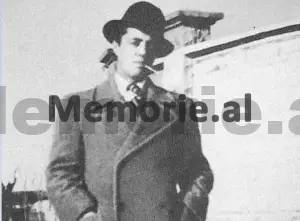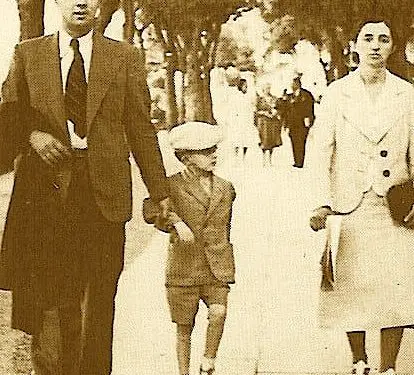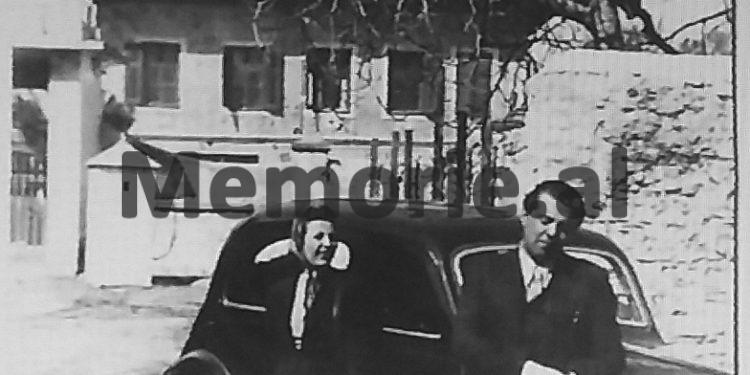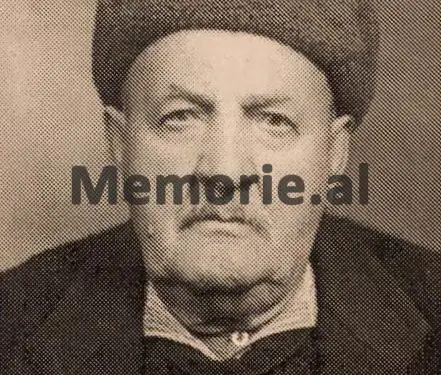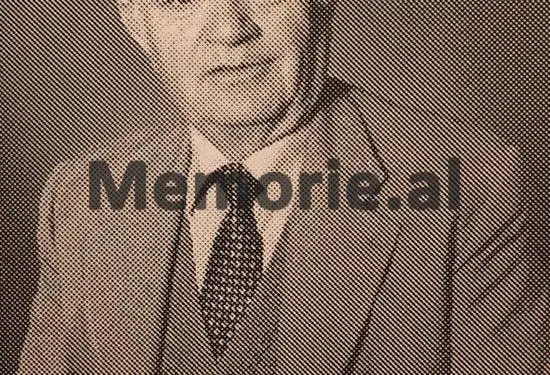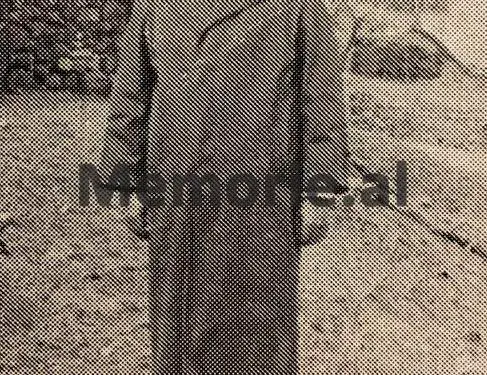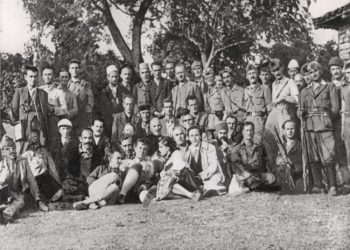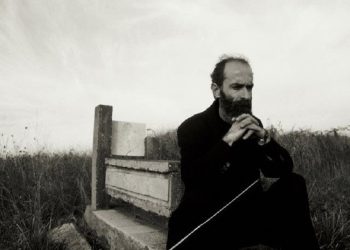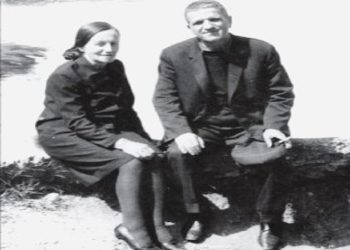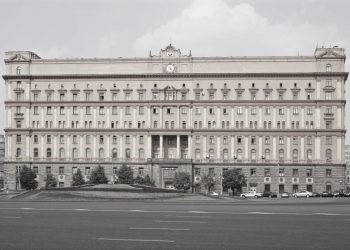Dashnor Kaloçi
Memorie.al publishes the unknown story of Ali Vllamasi, originally from the villages of Kolonja, the brother of the famous politician, Sejfi Vllamasi, a close friend and collaborator of Fan Noli, Avni Rustemi and Luigj Gurakuqi, as well as the brother of Muharrem Vllamasi, one of Enver Hoxha’s close friends since the period when he was studying in France, who during the period of the Italian occupation of the country, for some time became the chairman of the Fascist Party of Albania. The rare testimony of their nephew, Faslli Vllamasi, regarding the friendly relations that their Vllamasi family had with Enver Hoxha, who sometime around 1941, during a lunch at the House of Men in Tirana, asked Ali Vllamasi to he gave him his Nagant, but he did not give it to him, saying that he had a memory, but after the end of the war, he was sentenced to prison for “illegal possession of a weapon”, precisely because of that Nagant that he had never given to Enver. !
Enver Hoxha met my father Ali Hoxha for the first time in 1934 at the Turtulli Restaurant in Korça when Enver had just arrived from France for the summer holidays and had brought his father a suitcase with loot, which he had given him. our uncle, Sejfi Vllamasi, who was a political immigrant in Paris. The second time my father met Enver was in 1942, when my uncle Muharrem Vllamasi, who lived as a tenant at the Menikëve house in Tirana, had called Enver Hoxha and Dr. for lunch. Ymer Dishnica. During that lunch, Enver Hoxha asked his father for a nice nagant that he kept with him, but Ali did not give it to him, telling him that his brother Muharrem had a memory of him. After that, Enver said, “Ali, keep the nagant, but use it while fighting for us.” This is how Faslli Vllamasi, a former geological engineer, remembered the story of the Vllamasi family and his father Ali, who was the commander of the Novoselë territorial detachment in Kolonjë and after the war was declared a kulak and ended up in prison after refusing to hand over the nagant. that Enver Hoxha had once asked. But what is the past of Ali Vllamasi and his family? How did Ali tear down the Turkish flag at the club of Halit Bey Gjirokastra in Istanbul and who were the beys of Voshtima who, in order to receive pensions from Turkey, removed the Albanian flag from that club? Why did Ali Vllamasi defend Avni Rustemi when he was being tried by the French Justice for the assassination of Esat Pash Toptan? What was Ali’s relationship with Enver Hoxha and why in 1942 did he refuse to give his nagant to Enver Hoxha when he asked him during lunch at Muharrem Vllamasi’s house? What was Ali Vllamasi’s position after the war, how did he oppose the Aagrare Reform, and why was he sentenced to two years in prison?
From Vlora to Istanbul
Ali Vllamasi was born in 1883 in the village of Novoselë in the district of Kolonjë, which is located west of Mount Rodom and spent only three years of Turkish language schooling in his village. In 1913, when the Greek andarts burned Kolonja and the Vllamasi family, like many other settlers, they went and took refuge in the olive groves of Vlora, very close to Narta. In this regard, his son, Faslliu, testifies: “The patriotic activity of my father Ali, begins with his visit to the squads of Sali Butka and Themistokli Germenji where he became very famous in the battles that took place in Meles, Dhëmbel of Radom. When the Greek andarts burned Kolonja, Ali’s father was with Sali Butka’s platoon in Meles, and when he returned to the village and saw Novosela burned and reduced to ashes, the 150 houses where the smoke came out, he knelt down and cried like children. After that, Ali followed the path of other colonial Muhajirs, who settled on the outskirts of Vlora where they built their houses. Due to the difficult living conditions of the colonial Muhajirs in the olive groves of Vlora, there fell a cholera epidemic from which almost more than half of the Muhajirs who settled there died. Seven members of our large Vlach family also died from that epidemic. Seeing the difficult situation in which they found themselves, Father Aliu together with the other heads of the colonial families decided to move from Vlora and left for Turkey, where they settled in the province of Anatolia. During that time, the colonial families, led by their father Ali, found themselves under the terror of Kurdish gangs, which plundered them almost every day. Based on this, the father was forced to set up a small detachment and the Kurds were shot, and after that, they no longer appeared there. After being rescued from Kurdish gangs, the father went to work at a railway station run by an English company, and during that time he went on to graduate from high school at the age of seven at a British college. During that long period of emigration to Anatolia and Istanbul, the father received great help from Dibra patriots Said Najdeni and Fuat Bey Dibra, as well as from the Chief of the Istanbul Militia, Hasan Tasim Tetova, who armed the colonial immigrants to defend himself. from the Kurdish thieves ”, Faslliu recalls the time when his father Aliu, at the head of 150 colonial families in the village of Novoselë, settled in the distant Anatolia of Asian Turkey.
The incident for the Albanian flag
On November 28, 1924, when Ali Vllamasi was still like the emigrants in Turkey, an incident occurred to him with some other Albanian emigrants and that event which at that time caused a great commotion, in the province of Kolonjë, was remembered until recently. In this regard, Faslli testified: “Father Ali remembered and recounted the event only when his friends insisted on it. On November 28, 1924, the father, along with 12 other colonial captains, went to Istanbul after being invited by Halit Bey Gjirokastra to his club, where Albanian emigrants gathered every year and celebrated Flag Day with great ceremony. On that day, some beys from Voshtima were also there, who did not want the Albanian flag to be hoisted there, as they feared that the High Gate would not approve the demands they had made for pensions and salary increases. Father Ali, revolted by this and with a revolver in his hand addressed them calling them traitors and punched them. He then took and tore down the Turkish flag that was there in the bar and raised the Albanian flag in its place. After that, he took Nafus Bey Dibra to the top of the bar, saying that it was up to him to keep his word, as he was one of the most respected families by the Albanians who were there. When the owner of the restaurant, Halit Bey Gjirokastra, came and found out about the incident that took place there, he said: in the province of Cologne.
Defends Avni Rustemi
At the time that Avni Rustemi assassinated and killed Esat Pasha Toptan in Paris, one of the Albanians who came to his defense during the trial was Ali Vllamasi. Regarding this, Faslliu testified: “After many years of living in Anatolia and seeing that living there was quite difficult, my father and some other immigrants from the colonial principality decided to return to Istanbul. For this, they asked for the help of the Chief of the Istanbul Militia, who helped them to make the passports to the capital of Turkey. While his father was preparing documents for his passports, he was informed that Avni Rustemi had killed Esat Pasha Toptan in Paris and that he was being tried by the French Justice. After that, Father Aliu gathered all the settlers and told them to start each one with a telegram in defense of Avni Rustemi, and that day 300 telegrams were sent to Paris, while Ali himself started eight telegrams in defense of Avni that day. he had a close friend of my brother, Muharrem, my uncle, who had been the vice-president of the “Union” Society led by Avni. During the years of the Monarchy, our family had consequences from the people of Zog who imposed heavy taxes on us, due to the profane attitude of the two uncles, Sejfiu and Muharrem, who at that time had emigrated outside Albania as anti-Zogists “, Faslliu recalled. for father Ali, who came out of Istanbul to defend Avni Rustemi.
He refuses to give the nagant to Enver
What was the attitude of Ali Vllamasi and his family during the period of the Anti-Fascist War, what were its relations with Enver Hoxha? In this regard, Faslliu recalled: “During the years of fascist occupation, our house Vllamasi in Kolonjë became one of the strong bases of the partisans of that province where every night there were 40-50 partisans with their commanders, Qani Dumen, Muhamer Lekë, etc., and his father, Aliu himself, became the commander of the territorial partisan detachment of the village of Novoselë and chairman of the National Liberation Council. During the war years, Mehmet Shehu himself came there, whom our family received with all the honors and we threw his horse to eat 15 kg. wheat. Likewise, in addition to our father and uncle Muharrem, who was a partisan in the Peza Headquarters, from our family, we, Ali’s fourth children, became partisans. Big brother Novruzi was in the 5th Brigade, Fahriu in the “Revenge” Battalion and the 4th Brigade, Sister Razija in the “Revenge” Battalion and the 15th Brigade, and I was involved in the 2nd Brigade since my debut. th. During the war years, our family had a very good relationship with Enver Hoxha, who sometimes came to the house of our uncle Muharrem, who at that time lived as a tenant at Mënikët in Tirana. During lunch at that house when Enver had come along with Dr. Ymer Dishnica, he asked his father Ali, the nagant he wore on his belt, but his father did not give it to him, telling him that he remembered him from his brother Muharrem. After that, Enver told him: Ali, keep the nagant, but use it only for us “, Faslliu recalled the time when his father did not give Enver the nagant that he asked for.
In prison for nagant
But how was the Vllamasi family treated after the war? Regarding this, Faslliu recalled: “After the end of the war and the coming of the communists to power, the vicissitudes for our family began immediately. In fact, they had started during the war when the father was the head of the party and the partisans wanted to punish him by accusing him of embezzling 100 kg. sugar, which they later apologized for. In 1964, when the Agrarian Reform took four hectares of land from his father, he went to a rally in Erseka and told the Chairman of the District Executive Committee, Muço Strelca: “Why did we fight to release the rebels like Ymer Lamçja to take away the land I bought with gold? ” After that, Muço Strelca ordered Ali’s arrest, but there were many reactions from the crowd, and people shouted, saying that the brave commander Ali Vllamasi could not be arrested. But what they failed to do at that rally, the communist regime did later in December 1966, when the father was arrested and sentenced to two years in prison, accusing him of “unlawful possession of a weapon” for not handing over the nagant. that Enver Hoxha had once asked him and he had not given it to him “, Faslli Vllamasi concluded his story, adding that after Ali’s release from prison, they were declared kulaks and three times they tried to deport them, but they managed to escape only the intervention of Major General Petrit Dumes, who somewhat eased the persecution that followed the imprisonment of Sejfiu, one of the greatest personalities of Albanian politics of the first half of the last century.
The Vllamasi family graduated in Turkey, France, and Italy
Regarding the origin and past of the Vllamasi family, Faslliu testifies: “Our Vllamasi family is very well known throughout the province and my father Aliu was the second of five sons and two daughters that my grandfather, Myrteza Vllamasi, had. who since the last years of the ninth century has been the commander of the detachment of that province which was otherwise known and as a detachment against the “berihaj of the Turks”. Sejfiu was the first of the sons of my father’s family, followed by Ali, Avdyli, Ademi, and Muharrem, who was the youngest of five brothers. Sejfiu was born on September 15, 1879, and after studying in Edirne, Turkey, he graduated from the Vienna University of Veterinary Medicine, where he received a doctorate in science. Sejfiu has been known for his participation in the political life of Albania since 1905 when he returned from studies and was appointed chief veterinarian of the Municipality of Tirana. During his busy political career, Sejfiu was elected several times as a member of the Albanian Parliament and Minister. After the end of the war, he was sentenced by the communist regime to ten years in political prison and several years in exile and died at the age of 97 in the city of Fier. My father’s two other brothers, Avdyli and Ademi, after the family emigrated to Turkey, stayed there and never returned to Albania. Avdyli was educated at Istanbul University of History and Philology and died very young at the age of 29, having worked for several years as a teacher. The other uncle, Ademi, did not finish any high school, but worked hard and became very rich, and died in Istanbul at the age of 76. The last of the Vllamasi brothers was Muharremi, who was educated in Italy and graduated twice: in Economics in Bari and in Law in Rome. During the years of occupation, (1939-1943) Muharremi for some time became vice president of the Fascist Party of Albania, but then he moved with the Anti-Fascist Movement and after helping the main leaders of the Communist Party, giving them various information, he was elected to the Peza Headquarters. After the war, Muharremi worked in several senior positions in the state administration and was later interned in the city of Durrës, where he died in deep misery in 1973./Memorie.al




